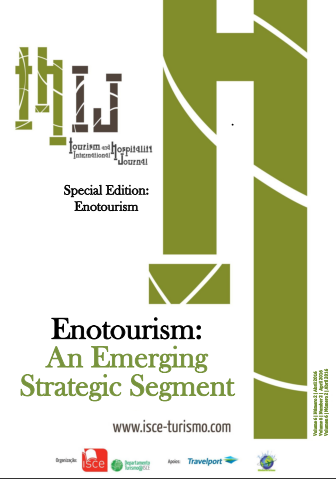O enoturismo como estratégia de desenvolvimento rural. O caso do pólo de enoturismo do departamento de Colonia-Uruguai.
DOI:
https://doi.org/10.57883/thij6(2)2016.30295Palabras clave:
Turismo, Desarrollo Rural, ClusterResumen
The Department of Colonia (one of the decimonovian policies - administrative divisions of Uruguay) has an important tourism development, concentrated in the historical centre of the capital city of the province. For a diversified tourism and in strengthening the framework of departmental development arises wine tourism as an activity with potential. Therefore, in this paper, it is defined as contributing to the knowledge and promoting the development of the wine tourism cluster of the department, as a strategy and instrument to promote rural development through the identification of potential, brakes and strategies implemented. The study design was the case study qualitative analysis, in which 19 semi-structured interviews about the potential actors of the cluster held. It corroborated the main working hypothesis, which establishes that the wine tourism cluster sprouting is composed of companies classified as "new" and / or "old", which operate independently with some coopetition could be considered the core of the cluster. The lack of articulation, coordination and projection of wine does not allow the acquisition of new proposals to complement the existing one preventing its consolidation. The cluster can contribute to the development of the territory if it articulates new proposals, and if it interacts with other actors, public or private land. To achieve the necessary interaction it intends to carry out a participative exploration of the available resources, the elaboration of a development plan, including the creation of a quality seal and the nomination of a coordinator for the plan, who will allow the continuation of the development proposal
Citas
Boschi, AM; García, MS. 2011. Nuevos productos turísticos: “Rutas del vino de la Patagonia en el Valle del Río Negro y Neuquén – Argentina”. Anuario de Estudios en Turismo – Investigación y Extensión. Facultad de Turismo – Universidad Nacional del Comahue Neuquén – Argentina. Año 11 - Volumen VII. [en línea] 8 de marzo de 2013. http://170.210.83.98:8080/jspui/bitstream/123456789/203/1/Articulo5_Boschi_Garcia.pdf
Castellanos Machado, C.; Castellanos Castillo, J. Elementos críticos para la evaluación del potencial de las regiones para la formación de clusters turísticos. Estudios de perspectivas turísticas [online]. 2013, vol.22, n.3 [citado 2015-04-29], pp. 450-472. Disponible en: http://www.scielo.org.ar/scielo.php?script=sci_arttext&pid=S1851-17322013000300005&lng=es&nrm=iso . ISSN 1851-1732
García Henche, B. 2005. Características diferenciales del producto turismo rural. Cuadernos de Turismo. Universidad de Alcalá de Henares. Madrid – España. Volumen (15), 113-133. [en línea]. 10 de abril 2015. http://dialnet.unirioja.es/servlet/articulo?codigo=1302242
http://revistas.um.es/turismo/article/view/18481/17831 Gilabert, D. 1989. Plan de estrategia de marketing para el turismo en España. Estudios turísticos, (104), 83-100. [en línea] 20 de octubre 2014. http://www.iet.tourspain.es/img-iet/Revistas/RET-104-1989-pag83-99-48476.pdf
Martínez López, J. 2004. Estratégicas y técnicas de investigación social. Universidad Mesoamericana. México. [en línea]. 20 de agosto 2014. http://www.geiuma-oax.net/sam/estrategiasmetytecnicas.pdf
Pastor, E. 2006. El turismo del vino, otra experiencia del ocio. Documentos del estudio del ocio. Universidad de Deusto Bilbao. Numero 30. [en línea] 6 de marzo de 2012. http://www.deusto-publicaciones.es/deusto/pdfs/ocio/ocio30.pdf
Porter, M. 1998. Clusters and the new economics of competition. Harvad business review [en línea]. New York. 20 de febrero 2015.
http://www.rimisp.org/wp-content/uploads/2012/07/31_rimisp_Cardumen.pdf Poon, A. (2003). Competitive strategies for a ‘new tourism’. Aspect of Tourism. Classic reviews in tourism. Edited by Chooper. pp 130-142. [en linea] 15 de marzo 2015 https://books.google.com.uy/books?hl=es&lr=&id=uB_ghXc1N1IC&oi=fnd&pg=P A130&dq=poon+tourism+technology+and+competitive+strategies&ots=hBNFzEqR
b&sig=dTd2XHcMg4ETOMzqAKW2OYTdWr0#v=onepage&q=poon%20tourism %20technology%20and%20competitive%20strategies&f=false
Riveros, H.; Blanco, M. 2003. El agroturismo, una alternativa para revalorizar la agroindustria rural como mecanismo de desarrollo local. Programa de Desarrollo de la Agroindustria Rural para América Latina y el Caribe (PRODAR). 33 p. [en línea] 18 de agosto de 2014. http://www.territorioscentroamericanos.org/turismorural/Documentos%20compartidos/El%20agroturismo,%20una%20alternativa%20para%20revalorizar%20la%20agroindustria%20rural.pdf
Silva Lira, I. 2003. Disparidades, competitividad territorial y desarrollo local y regional en América Latina. Serie 33 Gestión pública Comisión Económica para América Latina y el Caribe. [en línea] 10 de marzo de 2015. http://repositorio.cepal.org/bitstream/handle/11362/7286/S034200.pdf?sequence=1
Winesofuruguay. 2015. http://www.winesofuruguay.com/Turismo_Enologico
Descargas
Publicado
Cómo citar
Número
Sección
Licencia
Derechos de autor 2016 This work is licensed under a Creative Commons - Attribution 4.0 International (CC BY 4.0)

Esta obra está bajo una licencia internacional Creative Commons Atribución 4.0.
Este trabalho encontra-se publicado com a Licença Internacional Creative Commons Atribuição 4.0.






